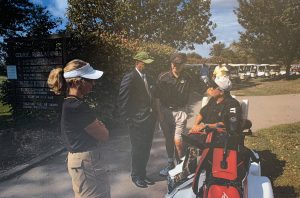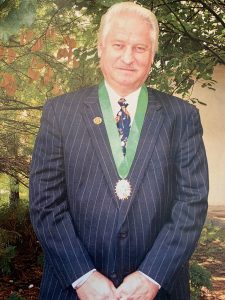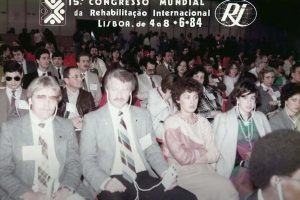Editor’s Note: Jerry Hitzhusen passed away in January 2022.
As Jerry Hitzhusen worked on his family’s farm growing up, he would oftentimes walk through the cornfields and wonder what lay beyond the borders of his northern Iowa home. Hitzhusen ended up spending his entire career not only travelling well past those borders – he also supported those in need the whole way.
Hitzhusen’s career spanned five decades, and his specialties in the University of Missouri College of Agriculture, Food and Natural Resources (CAFNR) focused on therapeutic recreation, leisure and mental illness, leisure and aging, and continuing education in therapeutic recreation. It’s a passion he spread to an international audience.
“It is not just the reach of his work but the population he served,” said David Vaught, former department chair for the parks, recreation and sport degree program in the School of Natural Resources (SNR). “Jerry was truly committed to those distanced by normal government programs. His effort to ensure access, equal opportunity and awareness of those with any disability is incredible. Jerry and his staff reached an aging population; those with disabilities, youth through adult; and anyone needing help. Whether a physical or mental disability, he and his staff created programs, conducted research, assisted with curriculum and broadened the awareness of mental health in Missouri and abroad.”

Hitzhusen’s work has been highlighted by numerous awards and accolades, including his most recent honor as an inductee into the Missouri Recreation and Parks Hall of Fame. The award was given to Hitzhusen for his dedication to assuring that each person has the opportunity for a quality life, regardless of physical challenges, age or ethnicity.
“On Jan. 30, my 80th birthday, I received a call that I had been nominated for the Hall of Fame,” said Hitzhusen, who retired five years ago and is an associate professor emeritus in SNR. “I usually don’t get surprised, but it was definitely a surprise. Apparently, my wife and son had been going into my home office to take pictures and gather my career highlights, as well as working throughout the fall with the organization. It was just a really big honor and I appreciated their efforts.”
Hitzhusen’s professional career with the University of Missouri began in 1974 when he returned to his alma mater as a state Extension therapeutic recreation specialist and assistant professor in the Department of Parks, Recreation and Sport. Hitzhusen earned his bachelor’s degree in education from Mizzou in 1963, and his master’s degree in recreation and park administration in 1972.
Hitzhusen followed his three brothers to the University of Missouri, as each of them attended on the GI Bill.
“When I first got to campus, registration took place in front of the columns,” Hitzhusen said. “The chancellor at the time was out there meeting the students. Once he saw my name all he could say was, ‘Not another Hitzhusen!’ My brothers may have had a bit of a reputation as individuals who liked to party. So that was my welcome to the university.”
After earning his bachelor’s degree, Hitzhusen spent four years in California as a social studies teacher and director of recreation and sports. Hitzhusen grew up playing sports and always had a love for athletics, which made the transition to coaching a fun one.
“A friend at the time got a job in California, so I followed them out that direction,” Hitzhusen said. “I didn’t have a job when I went there, but I got connected to with St. Cyprians School in Long Beach. When I arrived, I had six days to get ready to teach and begin my professional career. This was a very rewarding experience, and I still keep in touch with those students, who I taught in the 1960s, today.”
Hitzhusen returned to Iowa briefly after finishing his contract in California. He then made the trip back to Columbia to get his master’s degree. While in Columbia, Hitzhusen worked a few odd jobs, including owning a nightclub. He also met his future wife while completing his M.S.
Although he was focused on a degree in recreation and park administration, Hitzhusen happened upon his future career on accident.
“I got involved in therapeutic recreation through the mental health center here on campus,” Hitzhusen said. “It was actually kind of an accident. My roommate at the time was going over to interview for a job, and I decided to tag along. I ended up getting the job.

“I was immediately excited about the field of study.”
Hitzhusen joined Mizzou as faculty after a handful of years as director of therapeutic recreation for the Mid-Missouri Mental Health Center, and three years in Washington, D.C. Starting as an assistant professor, Hitzhusen eventually became an associate professor at MU.
“I could see the limitless opportunities within therapeutic recreation early on,” Hitzhusen said. “I saw it right away.”
Hitzhusen soon became a national and international advocate for disabled athletes and was committed to recreation therapy for veterans and advocacy for minority aging populations. One of his biggest accomplishments came just a year into his career at MU, when he developed the Midwest Symposium on Therapeutic Recreation. The symposium, which is still held each year, is a professional development and networking opportunity for individuals in therapeutic recreation and related fields. Hitzhusen led the symposium for more than 40 years.
The symposium also opened the door for Hitzhusen to share his knowledge with individuals on an international level. He held presentations, served as a guest lecturer and gave keynote addresses in multiple countries, including Puerto Rico (a country he’s been to 10 times), Japan, Israel, Trinidad and Tobago, Venezuela, Australia, England and Spain. Hitzhusen helped several of those countries prepare their own symposiums.
“I’m just a farm boy from Iowa,” Hitzhusen said. “I never dreamed I would see so much of the world. There are times where I still can’t believe it.”
In addition to the symposium, Hitzhusen developed several programs throughout his career, including Project LIFE (Leisure Is For Everyone) and Boots on the Green. Project LIFE helped train activity directors and related therapeutic recreation personnel in long-term facilities throughout the state. Boots on the Green brings together veterans with disabilities and PGA pros, allowing the veterans to practice their golf skills and learn from the best golfers in the world. Hitzhusen was also instrumental in helping develop the Paula J. Carter Center on Minority Health and Aging (PJCCMHA), which focuses on improving the quality of life for Missouri’s aging minority population. He served as chairman for the Missouri Department of Parks, Recreation and Tourism, too.
Hitzhusen worked with numerous university deans and presidents throughout the United States as well, encouraging them to make sure that their campuses were accessible. He had Elson Floyd, who served as the UM System president from 2003-07, tour the MU campus in a wheelchair.
“Elson was such a great advocate, and I was so proud of him for taking up the challenge,” Hitzhusen said.

Floyd presented Hitzhusen with the highest MU award for Extension in 2004, the C. Brice Ratchford Memorial Fellowship Award. Hitzhusen also earned the PALESTRA Leadership Award in Therapeutic Recreation, an honor only bestowed every 10 years. Those honors are just two of many awards Hitzhusen has earned during his illustrious career, which also includes multiple published papers and $6 million in grants and awards.
Hitzhusen, along with Chuck Graham (then state representative) and Lee Henson (then University of Missouri ADA coordinator), were also instrumental in bringing a wheelchair basketball program to MU in the early 2000s.
“Starting in 1978, Jerry helped organize wheelchair basketball exhibitions at Mizzou and in the Columbia community,” said Ron Lykins, head coach of the MU wheelchair basketball team, in his nomination letter to Missouri Recreation and Parks. “Local celebrities, along with MU students with physical disabilities, participated in these exhibitions and Jerry officiated the games. In 2001, Jerry assisted with the organization of an official game between the University of Illinois and the University of Texas-Arlington played in the Hearnes Center. This game showcased the abilities of collegiate wheelchair basketball players to the MU campus and community. This game played an important role in the startup of the wheelchair basketball program at the University of Missouri.”
Hitzhusen said he owes the majority of his success to those he worked with through the years.
“Working with people is so important in this success,” Hitzhusen said. “My goal has always been to make activities accessible to everyone; it’s what I’m truly passionate about. While it’s incredible that I’ve been able to share that passion across the globe, I couldn’t have done it all without the great people who I’ve worked with.”